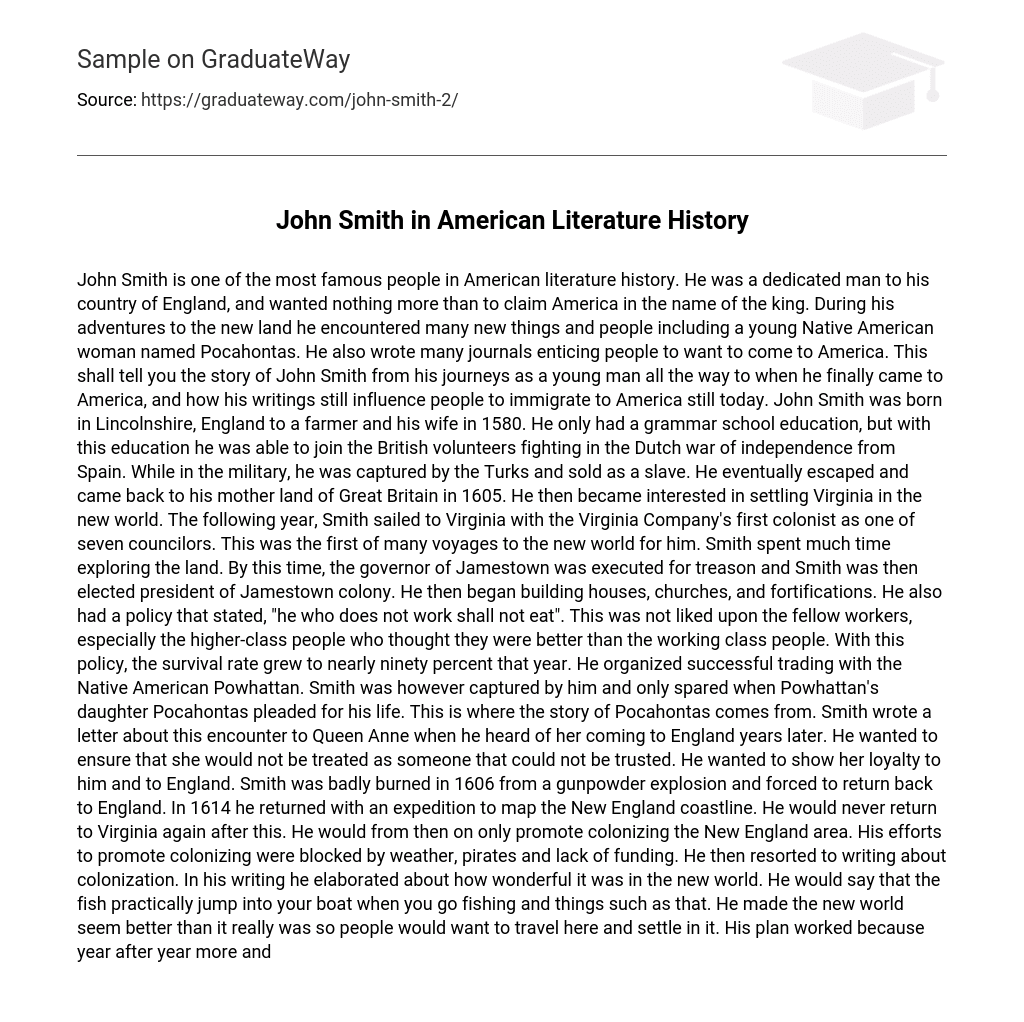John Smith, a renowned figure in American literary history, was a devoted Englishman who had an ultimate desire to establish ownership of America on behalf of the king. Throughout his explorations in the new land, he came across various novel experiences and individuals, among them being Pocahontas, a young Native American woman.
John Smith’s writings were a captivating call for people to come to America, chronicling his journey from childhood until he reached the new land. These texts still hold sway over immigration today. Born in Lincolnshire, England in 1580 to a farmer and his wife, John Smith attended a grammar school in pursuit of education. Despite lacking extensive formal training, he managed to join the British volunteers who fought against Spain during the Dutch war of independence. Regrettably, during his military service, he was seized by the Turks and forced into slavery.
After managing to escape and make his way back to Great Britain in 1605, Smith developed an interest in establishing a settlement in Virginia, the new world. In the subsequent year, he embarked on a voyage to Virginia with the first colonists of the Virginia Company, serving as one of seven councilors. This marked the beginning of numerous journeys he would undertake to the new world. Smith dedicated a significant portion of his time to exploring the land.
Following the execution of the governor of Jamestown on charges of treason, Smith assumed the presidency of the colony. During his tenure, he oversaw the construction of houses, churches, and fortifications. Smith introduced a policy highlighting the importance of labor in exchange for food. This measure faced opposition from colleagues, especially individuals belonging to higher social ranks who considered themselves superior to the working class.
The policy’s implementation led to a substantial rise in the survival rate, nearly reaching ninety percent. Moreover, it facilitated the establishment of lucrative trade with the Powhattan tribe, Native Americans. However, Smith was eventually captured by Powhattan and only Pocahontas, Powhattan’s daughter, intervened to save his life. This incident is widely recognized as the tale of Pocahontas. Years later, upon hearing about Queen Anne’s imminent visit to England, Smith penned a letter narrating this experience to prevent her from being viewed with suspicion.
Smith’s goal was to show his loyalty to both himself and England. In 1606, he experienced extensive burns from a gunpowder explosion that forced him to return to England. However, in 1614, he embarked on a journey to chart the New England coastline and never returned to Virginia again. As a result, he exclusively supported colonizing the New England area.
Despite facing obstacles such as inclement weather, pirates, and insufficient finances, his endeavors to encourage colonization were hindered. As a result, he turned to writing about the concept of colonization, highlighting the marvels of the new world. For instance, he enthusiastically described how fish seemed to practically leap into one’s boat while fishing.
John Smith portrayed the new world as a superior place to attract settlers, convincing them that it offered abundant opportunities. This strategy proved successful, as an increasing number of people flocked to New England each year, hoping to establish colonies without the fear of food scarcity. Even today, many aspects of Smith’s descriptions of America remain prevalent. Despite the passage of over four centuries since these writings were first published, people continue to be influenced by them. Foreigners often perceive America as a land of endless possibilities where one has no need to worry about basic necessities such as food and money.
In hopes that the rumors they have heard about America are true, they will gather and pack all they can and attempt to migrate there. This mirrors the actions of colonizers during the colonial period when they sought new opportunities. Nowadays, there is a significant influx of individuals migrating to America in pursuit of a better life. John Smith, renowned for his explorations of the new world and his leadership, guided numerous individuals to the Virginia plantations, albeit with some casualties. However, he was able to establish a thriving community.
Although he was primarily known as a non-fictional writer, John Smith’s works were largely fictional. While they were inspired by real events, he embellished and distorted the truth to create a fairytale-like narrative. His intention was to portray an idealized version of reality, successfully persuading many individuals to abandon their possessions and embrace his writings. Ultimately, John Smith can be seen as a savvy entrepreneur aiming to market America as his own creation.
He was likely the most successful in this aspect since people continue to use his writings as motivation to immigrate to America. Consequently, I believe he was perhaps the greatest businessman in history as he would still be profiting today if he received a commission for every person who relocated to America due to his writings, even four centuries after his death.





